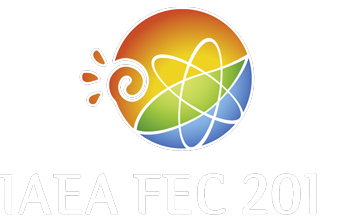Speaker
Prof.
Wonho Choe
(Korea Advanced Institute of Science and Technology)
Description
Application of toroidally non-axisymmetric (3D) magnetic fields has great impacts on the heat transport onto divertor target. The 3D magnetic fields form stochastic field layers by opening magnetic islands, leading to modifications of magnetic field structure and heat flux distribution on the divertor. The heat flux splitting pattern strongly depends on the applied field configuration, which is incorporated into 3D perturbed equilibrium. Understanding their physical relations can provide a new insight of divertor heat flux control under the 3D fields and clues for underlying physics of plasma response to the 3D fields. This presentation will describe simulations of magnetic field line splitting by 3D fields using field line tracing code POCA-FLT considering vacuum and ideal plasma response models, and compare them with heat flux striation patterns on the divertor target measured by IRTV in KSTAR. The measured striation patterns are well captured by distributions of magnetic field line connection length calculated by POCA-FLT code in the various 3D field configurations. Simulations reproduce the heat flux splitting on the target, while their agreement depends on the plasma response model used. Comparison results indicate that self-consistent inclusion of the plasma response physics is essentially required to achieve the best match to the heat flux measurement and better understanding of the edge 3D field structure.
| Country or International Organization | Republic of Korea |
|---|---|
| Paper Number | TH/P6-5 |
Author
Prof.
Wonho Choe
(Korea Advanced Institute of Science and Technology)
Co-authors
Dr
Chan Soo Kang
(National Fusion Research Institute)
Dr
Hyungho LEE
(National Fusion Research Institute)
Dr
Jong-Gu Kwak
(National Fusion Research Institute)
Dr
Jong-Kyu Park
(Princeton Plasma Physics Laboratory)
Dr
Joon-Wook Ahn
(Oak Ridge National Laboratory)
Dr
Kimin Kim
(Korea Advanced Institute of Science and Technology)
Dr
Si-Woo Yoon
(National Fusion Research Institute)
Dr
Yongkyoon In
(National Fusion Research Institute)

